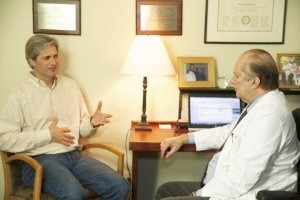 I’m still thinking about an article I read in the New York Times a few weeks ago by Nirmal Joshi, MD, who illuminated a significant challenge in our healthcare delivery system – the failure of the clinician to embrace a more effective way of communicating with their patients that is based on a biopsychosocial approach and hinges on the doctor’s ability to listen, explain, and empathize.
I’m still thinking about an article I read in the New York Times a few weeks ago by Nirmal Joshi, MD, who illuminated a significant challenge in our healthcare delivery system – the failure of the clinician to embrace a more effective way of communicating with their patients that is based on a biopsychosocial approach and hinges on the doctor’s ability to listen, explain, and empathize.
In the article, “Doctor, Shut Up and Listen,” Dr. Joshi describes the case of a patient who had seen a number of physicians for a “rapid heartbeat” and “feeling stressed.” She was referred to psychological counseling for an anxiety disorder after extensive testing was inconclusive. It was the counselor who finally “asked” her the necessary questions to get the patient to reveal that she was taking an over-the-counter weight loss product that contained ephedrine.
According to the article, “when she stopped taking the remedy, her symptoms also stopped. Asked why she hadn’t mentioned this information before, she said she’d “never been asked.” Until then, her providers would sooner order tests than take the time to talk with her about the problem.”
I have spent the majority of my career writing and speaking about how poor communication between physicians and their patients is detrimental to the delivery of quality patient care and the health care system in general. In 2012 I founded the Drossman Center for Education and Practice of Biopsychosocial Care, fulfilling a passion of mine to improve doctor-patient relationships in a way that ultimately improves health care delivery and outcomes by achieving physician and patient satisfaction and reducing unnecessary health care costs. Since that time we have had visitors from all over the US, Asia, and Latin America, have given workshops at national and international meetings and d have integrated these methods at medical centers as well.
Learn more about Rome AGA Workshop
Watch Simulated Patient Interview
Watch 12 Gurus Game Changing Presentation on Doctor-Patient Communication
Read “Helping Your Patients by Helping Yourself: How to Improve the Patient-Physician Relationship.” The full article was published in the April issue of the American Journal of Gastroenterology.
I applaud Dr. Joshi for bringing attention to this issue with his recent article that also noted that a review of reports by the Joint Commission, a nonprofit that provides accreditation to health care organizations, found that communication “failure (rather than a provider’s lack of technical skill) was at the root of over 70 percent of serious adverse health outcomes in hospitals.”
This is alarming. Now whether this failure is based on a lack of communication skills or understanding of the biopsychosocial approach to care, time constraints or overt refusal to listen, one thing is clear, we need to evaluate doctors for their ability to actively listen, empathize and engage in patient centered care, not just for their technical skills.
Why?
Because as Dr. Joshi writes and I agree, “a doctor’s ability to explain, listen and empathize has a profound impact on a patient’s care.” Yet, as he points out, one survey found, two out of every three patients are discharged from the hospital without even knowing their diagnosis; while another study found that in over 60 percent of cases, “patients misunderstood directions after a visit to their doctor’s office. And on average, physicians wait just 18 seconds before interrupting patients’ narratives of their symptoms.”
Yes, Dr. Joshi, we do have a long way to go.
What we are trying to do at the Drossman Center is to communicate the basics of good communication skills to clinicians and patients so that a higher quality of information is obtained and is done in a fashion that builds and strengthens the relationship. It’s not what you do (in the amount of time available) but how you do it that makes the difference. Through our preceptorship and mentoring programs clinicians at all stages of practice from GI fellows to senior clinicians are able to observe at our center methods and skills they can bring back to their practice. I encourage physicians to contact the Drossman Center to learn more about how our customized educational programs, resources and expertise can help their practices, medical centers and hospitals increase their efficiency, improve patient satisfaction and increase external funding for their health care programs.
Douglas A. Drossman, MD
 5826 Fayetteville Rd., Suite 201 Durham, NC 27713
5826 Fayetteville Rd., Suite 201 Durham, NC 27713  (919) 246-5611
(919) 246-5611 